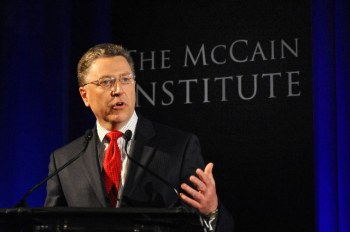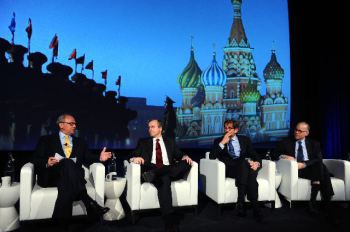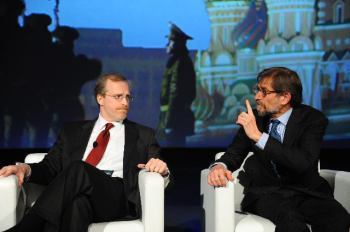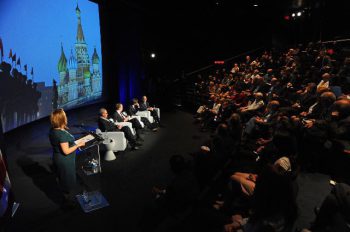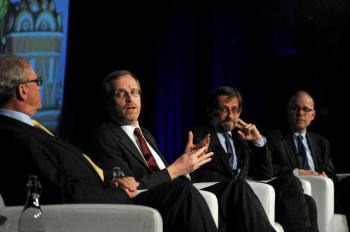Video
Event Summary
THE DEBATE:
On Tuesday, April 15, the McCain Institute for International Leadership at Arizona State University hosted the debate “Putin’s Russia: Time for Containment?” at the Burke Theater at the Navy Memorial in Washington.
The debate centered on the ongoing Ukrainian crisis, Putin’s actions, and the right Western response to them. Although Western democracies are united in condemning Russia’s intervention in Ukraine, its destabilizing efforts in Eastern Europe, and the annexation of Crimea, there is no consensus regarding the appropriate policy to handle the situation. Supporters of containment argue that this is the only way to stop Putin, while critics say that the United States can’t go it alone in fashioning an effective policy response.
THE TAKE AWAY:
Key Points Made in Support of Containing Russia:
- Putin poses the most serious threat to freedom, democracy, and international law the international community has seen in decades. The West cannot sit idly by, while Russia clamps down on democracy and human rights, annexes foreign territories, and violates international agreements. The Western powers must put principles before business interests or they risk allies not trusting them, and enemies not fearing them. The choice is between war or only severe sanctions.
- As long as the United States and the EU do not show unity and act proactively and decisively, Putin feels he has the upper hand. If Russia is not stopped, it will continue to threaten and destabilize countries that are vulnerable due to their geopolitical position, historical and cultural ties to Russia, and their Russian-speaking populations. Expansion of Russian subversion to the Baltics would also mean a threat to the European Union and NATO.
- Regardless of what its propaganda says, Russia is economically weak, vulnerable, and far more dependent on the United States and Europe than vice versa. Putin has overplayed his hand. A major reason for Putin’s aggression against Ukraine is to divert people’s attention from the domestic problems and economic hardships. The West has the leverage in this situation. Containment, hard-hitting sanctions, and cutting Russia out from the international community would be the best way to undermine Putin.
Key Points Made Against Containing Russia:
- This situation is not a replay of the Cold War. The policy choices and tools that were right at that period may not work today. We live in a different, more globalized world. Russia is part of the global economy, and Russia and the West share certain complementary security and regional interests, e.g., the fight against nuclear proliferation and radical extremism.
- The West is not united: There are huge differences between the potential consequences and repercussions for the United States and Europe. Yet unity between the United States and Europe is critical to any successful policy. Moreover, the United States cannot act alone, especially since after two wars, there is no domestic support for making new open-ended security commitments throughout Russia’s neighborhood, including in places like Ukraine that are on the verge of armed conflict.
- Ukraine is a deeply divided, and economically and politically unstable country. It needs time to address internal issues, develop democracy, and lay down the foundations of a stable economy, Due to Ukraine’s location, it is a mistake to suggest that there can be a lasting solution to the crisis without Russia’s involvement. Deliberately provoking Russia could inadvertently escalate the situation.
THE RECOMMENDATIONS:
Anders Åslund argued that the United States should impose much tougher sanctions on Russia, especially financial sanctions. As the US economy is nearly ten times larger than the Russian economy, and U.S.-Russian economic and trade relations are relatively insignificant, the negative economic impact on Americans would be very limited.
David J. Kramer recommended hard sanctions on Russian state-owned enterprises, banks, and individuals. He also stressed that we must refuse to recognize Crimea’s annexation by Russia, just as we did with the Baltic States’ incorporation into the Soviet Union. Treating Crimea as if it were lost would be a huge mistake and could have serious repercussions for the Baltic region’s future. He urged reassuring and preventive military deployments to NATO Allies near Ukraine.
Andrew S. Weiss predicted that the crisis in Ukraine will go on for a long time and will remain extremely complicated. He argued that while dialog and engagement are by no means magic bullets, taking them out of consideration and declaring that there is no room for a diplomatic solution would be a grave mistake.
Thomas Graham argued that it is necessary to open up channels of discussion and engagement and to resolve the crisis diplomatically, finding a way to advance U.S. interests.
WHAT IS YOUR DECISION?
THE DEBATERS
THE “CONTAINERS”: ARGUING IN SUPPORT OF CONTAINING RUSSIA
David J. Kramer
President of Freedom House
Anders Åslund
Senior Fellow at the Peterson Institute for International Economics
THE “ENGAGERS”: ARGUING IN SUPPORT OF A BALANCED APPROACH TO COUNTER RUSSIAN AGGRESSION AND INTERVENTION IN UKRAINE
Thomas Graham
Managing Director of Kissinger Associates, Inc
Andrew S. Weiss
Vice President for Studies at Carnegie Endowment for International Peace
MODERATOR
Elise Labott
CNN Foreign Affairs Reporter
